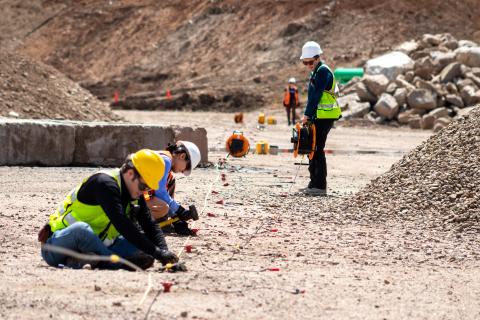All Categories
Featured
Table of Contents
Geophysicists: Salary, Career Path, Job Outlook, Education ... in Wattleup Australia 2023

(PREM)., and the boundaries in between layers of the mantle are constant with phase transitions.

Schematic of Earth's magnetosphere. Circulations from left to.
Inside the magnetosphere, there are fairly dense regions of solar wind particles called the Van Allen radiation belts. Geophysical measurements are generally at a particular time and place. Precise measurements of position, together with earth deformation and gravity, are the province of geodesy. While geodesy and geophysics are different fields, the two are so closely connected that numerous scientific companies such as the American Geophysical Union, the Canadian Geophysical Union and the International Union of Geodesy and Geophysics include both.
How To Become A Geophysicist in Leda Aus 2021
, integrates astronomical collaborates and the regional gravity vector to get geodetic coordinates. This method just supplies the position in 2 collaborates and is more tough to use than GPS.
Relative positions of 2 or more points can be figured out using very-long-baseline interferometry. Gravity measurements entered into geodesy due to the fact that they were required to associated measurements at the surface area of the Earth to the referral coordinate system. Gravity measurements on land can be made utilizing gravimeters released either on the surface area or in helicopter flyovers.
Water level can also be determined by satellites utilizing radar altimetry, adding to a more precise geoid. In 2002, NASA introduced the Gravity Healing and Climate Experiment (GRACE), where two twin satellites map variations in Earth's gravity field by making measurements of the distance between the two satellites utilizing GPS and a microwave ranging system. Satellites in space have actually made it possible to gather information from not just the visible light region, but in other areas of the electromagnetic spectrum. The planets can be identified by their force fields: gravity and their electromagnetic fields, which are studied through geophysics and area physics. Determining the modifications in acceleration experienced by spacecraft as they orbit has actually enabled fine information of the gravity fields of the planets to be mapped.
Geophysical Survey Services in Parmelia Aus 2023

Since geophysics is worried with the shape of the Earth, and by extension the mapping of features around and in the world, geophysical measurements include high accuracy GPS measurements. These measurements are processed to increase their precision through differential GPS processing. As soon as the geophysical measurements have been processed and inverted, the translated results are outlined using GIS.
Numerous geophysics business have actually created internal geophysics programs that pre-date Arc, GIS and Geo, Soft in order to meet the visualization requirements of a geophysical dataset. Exploration geophysics is used geophysics that often utilizes remote picking up platforms such as; satellites, aircraft, ships, boats, rovers, drones, borehole sensing devices, and seismic receivers.
For instance, aeromagnetic data (aircraft collected magnetic information) collected using conventional fixed-wing aircraft platforms need to be corrected for electro-magnetic eddy currents that are developed as the airplane moves through Earth's magnetic field. There are likewise corrections associated with changes in measured prospective field strength as the Earth rotates, as the Earth orbits the Sun, and as the moon orbits the Earth.
What Is Geophysics? in Gooseberry Hill Aus 2023
Signal processing involves the correction of time-series data for undesirable noise or mistakes introduced by the measurement platform, such as aircraft vibrations in gravity information. It also involves the reduction of sources of noise, such as diurnal corrections in magnetic information., meteorology, and physics.
The magnetic compass existed in China back as far as the 4th century BC. It was not till good steel needles could be forged that compasses were used for navigation at sea; prior to that, they might not maintain their magnetism long enough to be beneficial.
By taking a look at which of eight toads had the ball, one might figure out the instructions of the earthquake. It was 1571 years prior to the first style for a seismoscope was released in Europe, by Jean de la Hautefeuille. It was never ever constructed. One of the publications that marked the start of modern science was William Gilbert's (1600 ), a report of a series of careful experiments in magnetism.
Geophysicists: Salary, Career Path, Job Outlook, Education ... in Westminster Australia 2022
In 1687 Isaac Newton published his, which not just laid the structures for classical mechanics and gravitation however likewise explained a range of geophysical phenomena such as the tides and the precession of the equinox. The very first seismometer, an instrument capable of keeping a constant record of seismic activity, was constructed by James Forbes in 1844. Dietmar; Sdrolias, Maria; Gaina, Carmen; Roest, Walter R. (April 2008). "Age, spreading rates, and spreading out asymmetry of the world's ocean crust". Geochemistry, Geophysics, Geosystems. 9 (4 ): Q04006. Bibcode:2008 GGG ... 9. 4006M. doi:10. 1029/2007GC001743. S2CID 15960331. "Earth's Inconstant Electromagnetic field". science@nasa. National Aeronautics and Area Administration. 29 December 2003. Recovered 13 November 2018.
Runcorn, S.K, (editor-in-chief), 1967, International dictionary of geophysics:. Pergamon, Oxford, 2 volumes, 1,728 pp., 730 fig Geophysics, 1970, Encyclopaedia Britannica, Vol. Introduction to seismology (2nd ed.).
Latest Posts
Where Can A Geophysicist Work Other Than The Oil Industry? in Ellenbrook Oz 2021
Geophysicist in Como Aus 2022
Geophysical Surveys Definition & Meaning In Stock ... in Karrinyup Aus 2022